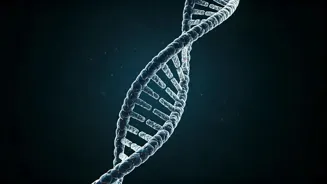The Extraordinary Individual
The focus of the study was an individual who achieved an exceptional feat: reaching the age of 117. This person's life, spanning over a century, provides
a unique window into the processes of aging. Her remarkable longevity sparked intense scientific interest, prompting researchers to investigate the biological mechanisms behind her extended lifespan. The primary objective was to identify genetic or environmental factors that might have contributed to her ability to live longer, healthily. This case presented a rare opportunity to understand the extreme limits of human life and how the body may resist the effects of aging over time.
Genetic Exploration Begins
Scientists launched a thorough examination of the individual's genetic makeup. The process involved detailed analysis of her entire genome, searching for any distinct features. Their goal was to pinpoint the genes or genetic variations that differed. Researchers hypothesized that these could be linked to longevity. Advanced sequencing technologies allowed scientists to thoroughly study the genome. They examined specific gene sequences and epigenetic markers. The goal was to identify specific genetic variations or unique patterns. The identification of these elements could clarify the secrets of her prolonged health and longevity, offering insight into the fundamental biological processes governing aging.
Key Genetic Discoveries
The research uncovered some interesting findings. Scientists observed significant differences in genes related to cellular repair and the immune system. Specific genes, linked to DNA repair mechanisms, showed variations that may have enhanced their efficiency. These genetic distinctions could have provided greater protection against cellular damage. Scientists looked at genes involved in inflammation and immune function. They found variations that possibly minimized inflammation. Inflammation is an age-related factor and reducing it could contribute to the woman's health. These genetic characteristics offered valuable clues about the processes that could promote longevity. Understanding these genetic distinctions can potentially help with the development of treatments and preventative strategies.
Implications for Aging Research
The study’s findings have major implications for aging research. The identification of specific genetic variations that could influence lifespan and health suggests new areas of research. This discovery could also help in developing ways to promote healthy aging. Researchers can investigate how lifestyle factors, such as diet and exercise, interact with these genes. Scientists could also develop personalized approaches to extend healthy lifespans. Moreover, by comparing the woman's genome with those of shorter-lived individuals, researchers might identify additional genetic influences on aging. These comparative analyses provide a clearer view of the complex factors influencing longevity.
Future Directions
Future studies will focus on the identified genetic variations. Researchers plan to conduct more in-depth analyses to understand their specific roles. They may also conduct experiments to investigate the potential effects of these genes. Scientists are also keen to explore the interaction between genetics and lifestyle. This could help in developing targeted interventions that promote longer and healthier lives. The goal is to integrate the research results with advancements in other areas, like epigenetics. Such efforts could lead to a deeper comprehension of the multiple factors. The hope is to identify how to extend healthy lifespans and improve the quality of life for people worldwide.














